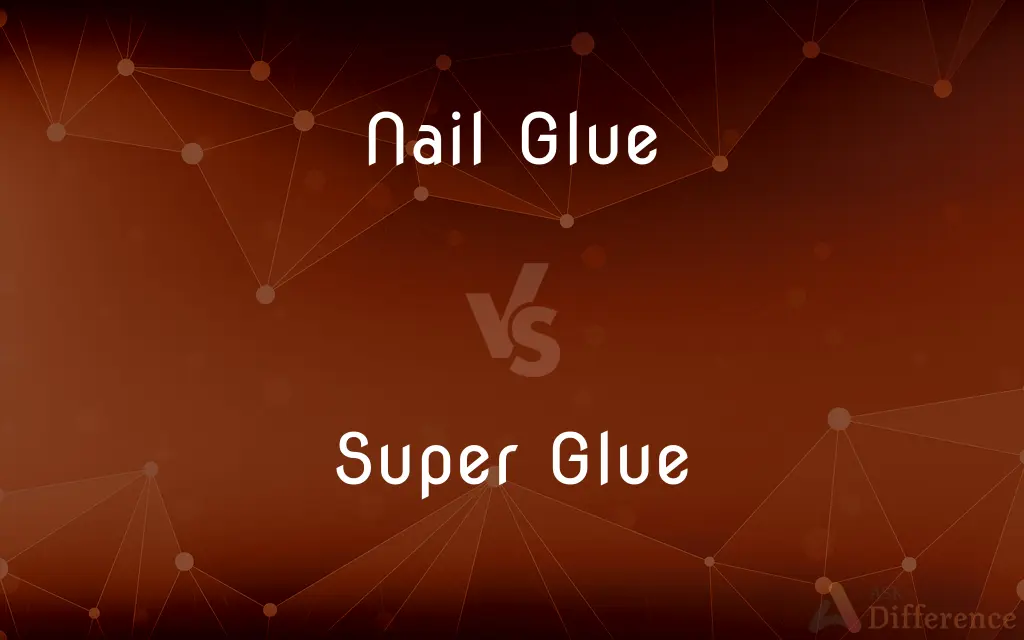Nail Glue vs. Super Glue — What's the Difference?
By Tayyaba Rehman & Fiza Rafique — Published on March 9, 2024
Nail glue is specifically formulated for attaching artificial nails and repairing natural nails, while super glue is a general-purpose adhesive used for a wide range of materials, not designed for safe use on skin or nails.

Difference Between Nail Glue and Super Glue
Table of Contents
ADVERTISEMENT
Key Differences
Nail glue and super glue both serve the purpose of adhesion, but they are formulated for different uses. Nail glue is designed with the safety and health of nails in mind, ensuring that it can securely attach artificial nails or repair splits or breaks in natural nails without causing damage. It is typically made from ingredients like ethyl cyanoacrylate, which is strong enough for nail applications but gentle enough to minimize harm to the natural nail bed.
Super glue, on the other hand, is a more potent adhesive with a broader application range, including bonding materials like plastic, metal, wood, and ceramics. Its composition, often based on cyanoacrylate, creates a durable bond quickly. However, its strength and chemical properties can be harmful to skin and nails, potentially causing irritation, chemical burns, or damage to the nail bed if used improperly.
Both types of glue dry quickly and form a strong bond, but nail glue's formula is optimized for flexibility and durability on nails, accommodating natural nail movement without cracking. Super glue lacks this flexibility, which can lead to discomfort or damage when applied to nails.
The removal process also differs; nail glue can be removed with acetone or nail glue remover, designed to safely dissolve the adhesive without excessive damage to the natural nail. Removing super glue from skin or nails requires more care to avoid injury, and while acetone can still be used, the removal process may be more challenging and potentially damaging.
Choosing the correct adhesive is crucial for the health and safety of your nails. Nail glue is the recommended choice for nail enhancements and repairs, while super glue is best reserved for non-biological materials.
ADVERTISEMENT
Comparison Chart
Primary Use
Attaching artificial nails and repairing natural nails
Bonding a wide range of materials (not intended for skin or nails)
Composition
Ethyl cyanoacrylate, formulated for use on nails
Various types of cyanoacrylate, designed for strong, quick-drying adhesion
Safety
Designed to be safe for use on skin and nails
Can cause skin irritation, chemical burns, and is not recommended for use on skin or nails
Flexibility
Flexible, accommodating natural nail movement
More rigid, which can lead to discomfort or damage when used on nails
Removal
Can be removed with acetone or nail glue remover
Removal from skin or nails can be challenging and may require acetone
Compare with Definitions
Nail Glue
Provides flexibility for natural nail movement.
Despite her active lifestyle, the nail glue kept the artificial nails in place.
Super Glue
Forms a strong, rigid bond quickly.
The super glue bonded the plastic pieces in seconds.
Nail Glue
A specialized adhesive for artificial nails and nail repairs.
She used nail glue to attach her press-on nails securely.
Super Glue
Removal from skin requires care to avoid damage.
Acetone helped remove the super glue from his fingers, but with caution.
Nail Glue
Safe for contact with skin and nails.
Accidental skin contact with nail glue was easily managed without irritation.
Super Glue
Versatile in non-biological applications.
Super glue was the go-to for fixing a wide range of household items.
Nail Glue
Formulated to minimize damage to natural nails.
The nail glue repaired the split without harming her nail bed.
Super Glue
A powerful adhesive for a variety of materials.
He used super glue to repair the broken ceramic vase.
Nail Glue
Designed for easy removal with acetone.
Nail glue residue was gently removed with nail glue remover.
Super Glue
Not intended for use on skin or nails due to potential harm.
Super glue caused irritation when it accidentally got on her skin.
Common Curiosities
Can I use super glue if I run out of nail glue?
While some people do, it's not recommended due to potential skin irritation and damage to the natural nail.
Can super glue cause allergic reactions?
Yes, super glue can cause allergic reactions, especially with prolonged or repeated exposure.
Is there a difference in drying time between nail glue and super glue?
Both types of glue dry quickly, often within seconds, though this can vary slightly based on formula and application thickness.
Can super glue be used in emergency medical situations?
Medical-grade cyanoacrylate glues are used in some medical situations, but commercial super glue is not recommended for treating wounds.
How can I safely remove super glue from my skin?
Acetone, found in nail polish remover, can dissolve super glue, but use it with care to avoid skin irritation.
Is nail glue or super glue waterproof?
Both types of glue can be resistant to water, but super glue generally offers a higher level of water resistance for non-biological materials.
Are there eco-friendly alternatives to these glues?
While eco-friendly options for super glue are limited, there are more natural, less harsh alternatives for nail applications, though they may not offer the same strength or durability.
Is nail glue as strong as super glue?
Nail glue is strong enough for its intended use on nails but may not provide the same level of adhesion for other materials as super glue.
Can I use nail glue on sensitive skin?
Nail glue is formulated to be safer for use on skin and nails, but if you have sensitive skin, proceed with caution and consider conducting a patch test first.
How long do the bonds created by these glues last?
The durability of the bond depends on factors like material, application, and environmental conditions, but nail glue is specifically designed to last until the next salon visit or nail change.
Share Your Discovery

Previous Comparison
Shepherd’s Pie vs. Cottage Pie
Next Comparison
Jews vs. GentilesAuthor Spotlight
Written by
Tayyaba RehmanTayyaba Rehman is a distinguished writer, currently serving as a primary contributor to askdifference.com. As a researcher in semantics and etymology, Tayyaba's passion for the complexity of languages and their distinctions has found a perfect home on the platform. Tayyaba delves into the intricacies of language, distinguishing between commonly confused words and phrases, thereby providing clarity for readers worldwide.
Co-written by
Fiza RafiqueFiza Rafique is a skilled content writer at AskDifference.com, where she meticulously refines and enhances written pieces. Drawing from her vast editorial expertise, Fiza ensures clarity, accuracy, and precision in every article. Passionate about language, she continually seeks to elevate the quality of content for readers worldwide.













































